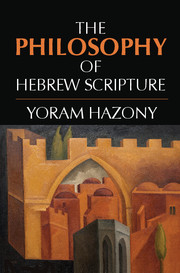Book contents
- Frontmatter
- Contents
- Acknowledgments
- Note on the Text
- Introduction Beyond Reason and Revelation
- Part I Reading Hebrew Scripture
- Part II The Philosophy of Hebrew Scripture
- 4 The Ethics of a Shepherd
- 5 The History of Israel, Genesis–Kings
- 6 Jeremiah and the Problem of Knowing
- 7 Truth and Being in the Hebrew Bible
- 8 Jerusalem and Carthage
- Part III Conclusion
- Appendix What Is “Reason”? Some Preliminary Remarks
- Notes
- Index of Names
- Index of Scriptural References
- References
8 - Jerusalem and Carthage
Reason and Faith in Hebrew Scripture
from Part II - The Philosophy of Hebrew Scripture
Published online by Cambridge University Press: 05 November 2012
- Frontmatter
- Contents
- Acknowledgments
- Note on the Text
- Introduction Beyond Reason and Revelation
- Part I Reading Hebrew Scripture
- Part II The Philosophy of Hebrew Scripture
- 4 The Ethics of a Shepherd
- 5 The History of Israel, Genesis–Kings
- 6 Jeremiah and the Problem of Knowing
- 7 Truth and Being in the Hebrew Bible
- 8 Jerusalem and Carthage
- Part III Conclusion
- Appendix What Is “Reason”? Some Preliminary Remarks
- Notes
- Index of Names
- Index of Scriptural References
- References
Summary
In recent years, it has again become popular to speak of Jerusalem and Athens as representing contradictory and irreconcilable ways of interpreting reality and determining the conduct of our lives. Historically, this insistence on an absolute opposition between the Bible and the philosophy of ancient Greece has been most closely associated with the Church Father Tertullian, who famously asked “What indeed has Athens to do with Jerusalem? What concord can there be between the Academy and the Church? What between heretics and Christians?” But Tertullian was hardly alone in this. His Jerusalem–Athens dichotomy launched an entire discourse within the Western tradition based on two premises that are by now often presented as if they were self-evidently correct and in need of no further discussion. These are the assumptions that:
(i) “Faith” and “reason” name distinct and opposed aspects of mankind’s mental endowment; and that
(ii) The tradition of thought found in the Bible represents and encourages the first of these, whereas Greek philosophy embraces the second.
These premises have been extraordinarily fruitful in the history of the Christian West, inspiring some to defend faith against reason, others to champion reason against faith, and yet others to argue that the two can be reconciled – all of this within the framework established by Tertullian and while treating his two premises as an appropriate basis for discussion. Nevertheless, my own view is that both of these premises are almost certainly false: I do not believe the dichotomy between faith and reason is very helpful in understanding the diversity of human intellectual orientations. I say this, among other reasons, because I think it is an empirical fact that the faithful are in many cases quite reasonable individuals, whereas those who are most intransigent in their unreason are often the most unfaithful. And I do not believe that either the tradition of inquiry preserved in the Hebrew Scriptures or the tradition of discovery represented by the writings of Plato and Aristotle are particularly well suited to play the roles usually assigned to them in the often facile debate that ensues once the supposed opposition between faith and reason is taken as a point of departure.
- Type
- Chapter
- Information
- The Philosophy of Hebrew Scripture , pp. 219 - 256Publisher: Cambridge University PressPrint publication year: 2012



